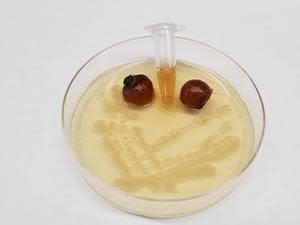Cedarville University Researchers Pursue Mosquito Repellant Solution
Pharmacy Professor, Students Study Soapberry Extract
Soapberry Extract

Soapberry shells pictured with a tube of soapberry extract on a plate of actively growing bacteria.
The Leading Professor

Dr. Tim Veenstra, associate professor of pharmaceutical science at Cedarville University
CEDARVILLE, OHIO, Oct. 21, 2021 (GLOBE NEWSWIRE) -- Americans have plenty of options to kill bacteria and repel mosquitoes, two sources of disease. In many developing nations, those resources aren’t readily available. But a tropical fruit not very well known to Americans, but available in many places around the world, might provide a solution.
A team of researchers from Cedarville University is looking into the potential bacteria-killing, insect-repelling properties of soapberry extract. Various species of soapberry plants can be found throughout eastern and southern Asia, the Pacific islands and the Americas, including the southeastern U.S., Texas and Hawaii.
Dr. Tim Veenstra, an associate professor of pharmaceutical science in Cedarville’s school of pharmacy, is working on this team alongside second-year Doctor of Pharmacy students Daniel Tellock of Richmond, Minnesota; Gabriel Thomas of Fenton, Michigan; and Ekenedirichukwu Obi of Ypsilanti, Michigan.
A missionary told Cedarville professors about the potential bactericidal and insect-repelling properties of soapberries, and Veenstra decided to take up the project.
“I thought the applicability to potentially help people in the real world was great,” Veenstra said. “Developing nations are typically in tropical zones, and soapberries are prevalent among many of those nations.”
This investigation was designed to discover an easy application in tropical and subtropical regions so individuals or communities can make their own soapberry solution. For instance, one way that team members are generating extract is from the soapberry shell, or pericarp, by boiling the shell in water. There are more effective ways to produce soapberry extract, but Veenstra noted that the substances needed for those processes aren’t easy to acquire in rural, developing regions.
The researchers are also working to find the right concentration of soapberry extract for a solution of soapberry extract and water. Pure soapberry extract is greasy, which may discourage people from using it. They found that on lab plates, a solution with 25% soapberry extract and 75% water was effective in preventing the growth of the bacteria E. coli.
In terms of the extract’s potential to repel insects, Veenstra said that the researchers got mixed results when testing it on fruit flies. But he noted that the researchers want to revisit the method they used for those tests to get more conclusive results.
The research team isn’t done yet. While they’ve tested the properties of soapberry shell extract, the researchers also want to test the extract of the inner nut and the whole fruit to determine the most effective solutions.
One potential application for the soapberry extract is disinfecting surfaces. The researchers hope to test the extract’s disinfectant properties to determine how long the bactericidal properties last. Another potential application would be as a treatment for mosquito nets, to offer an additional layer of protection against mosquito-borne diseases.
Above all, Veenstra wants to help people with something readily available to them.
“It’s something that could be spread through a missionary network,” Veenstra said. “I have no interest in a commercial product; I just want to find something that people can use.”
Located in southwest Ohio, Cedarville University is an accredited, Christ-centered, Baptist institution with an enrollment of 4,715 undergraduate, graduate and online students in more than 150 areas of study. Founded in 1887, Cedarville is one of the largest private universities in Ohio, recognized nationally for its authentic Christian community, rigorous academic programs, including the Doctor of Pharmacy program, strong graduation and retention rates, accredited professional and health science offerings and high student engagement ranking. For more information about the University, visit cedarville.edu.
Written by Bryson Durst.
Attachments
CONTACT: Mark D. Weinstein Cedarville University 937-766-8800 mweinstein@cedarville.edu


 Yahoo Finance
Yahoo Finance 